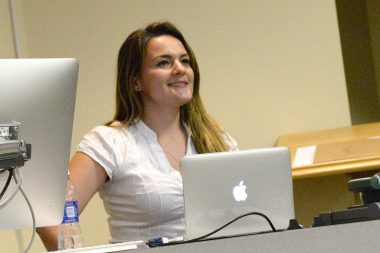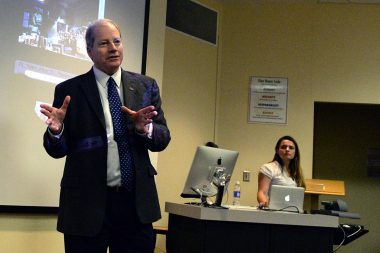New York City-based freelancer Yana Paskova led an Oct. 22 presentation titled “Cuba in Transition,” which detailed her international work as well as her own upbringing in Europe.

As part of her Oct. 22 lecture, titled “Cuba in Transition,” in the McEwen Communications Building, Paskova explained that the bright neck cloths signified the youngsters’ solidarity – sometimes genuine, but often otherwise – with the Communist Party.
One of the images, depicting a young Cuban boy, Paskova shot during an investigative reporting trip she took a few months ago. The Pulitzer Center on Crisis Reporting sponsored her visit to the Caribbean island.
The second photo was even more personal to Paskova for she herself was pictured, the image snapped during her own youth in her birth country of Bulgaria.
This personal connection to her work was one of many highlights during Paskova’s informal lecture, where she delved into a series of topics that included her upbringing, her professional career and the political climates across the globe. The event was co-sponsored by the School of Communications and the Pulitzer Center.
“Looking for motivation and inspiration everywhere is essential,” explained Paskova, noting the skills needed to succeed in freelance photojournalism. “It’s not an easy business to enter, but as long as you have a passion for it, you will never be sorry you went into it.”

“It was a very lonely place,” Paskova said.
In stark contrast to these solitary conditions, the freelancer also detailed her experiences on the U.S. presidential campaign trail as well as the activity she encounters in her current home, New York City.
As she discussed her work highlighting an upscale dinner party, a recent police academy graduation and a generic swimming photo, Paskova challenged students to think differently when behind the lens.
“Always look for stuff that is really unique, different and visual,” she said. This ability to find creativity in nondescript situations, like a formal press stop on a campaign tour, is especially important, she said.
Before concluding with an informal Q&A session, Paskova offered insight from her work in Cuba and discussed the country’s political and cultural climates. She then noted the parallels between her own upbringing and that of the Cuban children and young adults she encountered.
During his introduction of Paskova, Glenn Scott, associate professor of communications, commended the photojournalist for her interest in bringing to light underreported stories as well as the Pulitzer Center for supporting her work.
“The Pulitzer Center sponsors freelance journalists who go around the world to cover important stories that might otherwise not be covered,” he said. “I’ve been very impressed with what Yana’s done and what she’s going to do.”
He then challenged the audience to listen closely to Paskova’s experiences and consider their own possibilities. “Imagine going to another country to tell humanitarian stories that the rest of us need to hear,” he said. “Without people like her … it wouldn’t happen.”
In addition to her lecture, Paskova spoke to students in six journalism classes during her campus visit and met with a few student-media groups, including The Pendulum.


